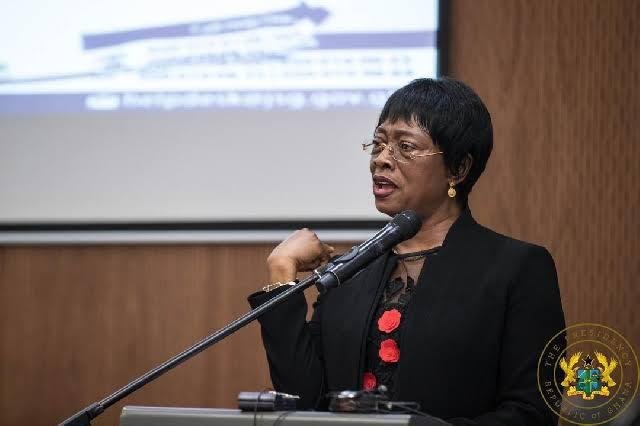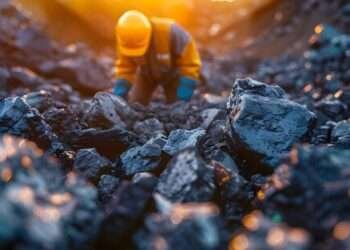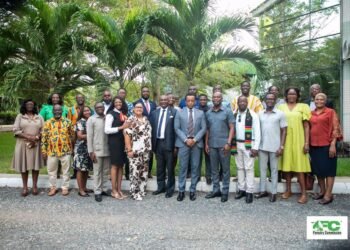The former Chief Justice of the Supreme Court, Mrs. Sophia Akufo, has made a clarion call for Ghanaians to prioritize the responsible governance and management of the country’s abundant natural resources.
The former Chief Justice’s call comes in the wake of the country’s low development in proportion to the abundance natural resources including gold, oil, timber, diamond, etc.
Mrs. Sophia Akufo therefore, charged every Ghanaian to show interest in how these abundance natural resources are managed to ensure equitable and balance development.
“I think our natural resource governance and management and administration and everything should be a bee in every Ghanaians bonnet. It’s our natural resource. It is our natural endowment from God. That’s what he gave us. He planted it into the land for us. It’s his gift to us.”
Mrs. Sophia Akufo
Invoking a biblical analogy, she further asserted that these endowments are a means development that should rightfully empower the nation, rather than perpetuate poverty and environmental degradation.
Safeguarding the Nation’s Wealth

Drawing on her wealth of experience, advocacy and a deep sense of national pride, Mrs. Akufo eloquently holds the view that, the affairs of the country’s natural resource should be a concerned matter to every Ghanaian.
She also went on to challenge the narrative of Ghana’s perceived poverty, arguing that “the Bible says that he has blessed us with every blessing that we need. So why do we keep going to IMF? Why should we even consider ourselves poor?”
In drawing lessons from the Paradox of plenty ideology, the former Chief Justice’s observations painted a stark contrast between the wealth of natural resources found in towns like Obuasi, Tarkwa, and Akwatia, and the grim realities of environmental degradation and socioeconomic decline that have plagued these communities.
“Imagine the amount of gold. If you go to Akwatia, imagine the amount of diamonds. Imagine all the natural resources that have flowed from these towns. And the processes do not, or ordinarily also do much good to the environment.”
Mrs. Sophia Akufo
Untapped Potential and Emerging Opportunities

Ghana’s extractive industry has long been dominated by the exploitation of gold, with the country ranking among the top producers in Africa. However, the recent discovery of substantial lithium deposits in Ewoyaa in the Central Region has opened up new frontiers for the nation’s mineral wealth.
While the country navigates this evolving landscape, the effective governance and sustainable management of these resources will be crucial in unlocking their respective true potential thereby, translating them into tangible benefits for the nation and its citizens particularly the local communities.
Environmental Protection and Community Wellbeing

Mrs. Akufo’s impassioned address reflects a deep concern for the environmental degradation and the neglect of local communities that have been the byproducts of Ghana’s extractive activities.
She also lamented the grim realities of towns like Prestea, where “the processes do not, or ordinarily also do much good to the environment.”
Her call for a holistic approach to resource governance signifies the need to balance economic development with environmental stewardship and community empowerment.
The former Chief Justice’s remarks shed light on the complex governance challenges that have plagued Ghana’s extractive sector, including issues of political mismanagement, lack of transparency, and the entrenchment of vested interests.
She holds the view that addressing these deep-rooted problems will require a comprehensive and sustained effort to reform the sector’s governance frameworks with regards to how our natural resources are used.
Ownership of Natural Wealth

Mrs. Akufo’s impassioned appeal to the Ghanaian people underscores the need for a renewed sense of patriotism, national ownership and responsibility over the country’s natural resources.
Her emphasis that the natural resources belong the country and must be used to the full benefit of its people intends to invoke a sense of altruism.
By fostering this collective consciousness and empowering Ghanaians as the primary custodians of their wealth, the path towards sustainable and equitable resource governance can be paved.
The former Chief Justice’s words carry the weight of experience and a profound sense of patriotism. Her clarion call for Ghanaians to make the governance of their natural resources a “bee in every Ghanaians bonnet” serves as a rallying cry for a fundamental shift in the nation’s approach to resource management.
READ ALSO : Banks to Adjust Lending Rates Upward as GRR Edges Up for November 2025























